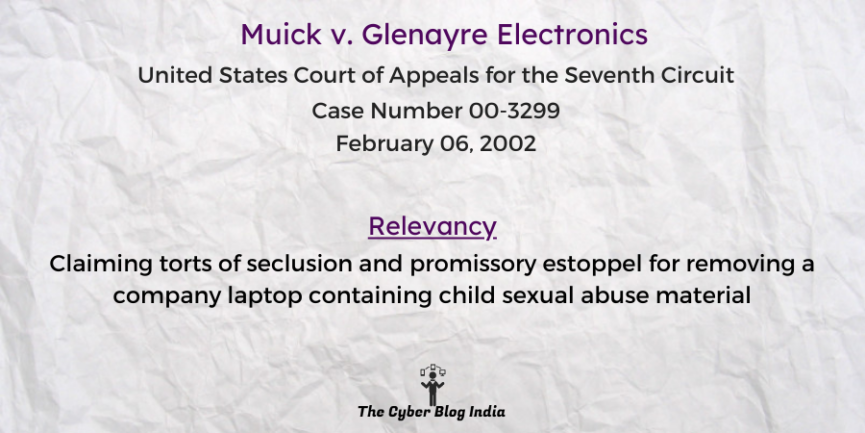Muick v. Glenayre Electronics

Muick v. Glenayre Electronics
280 F.3d 741
In the United States Court of Appeals for the Seventh Circuit
Case Number 00-3299
Before Circuit Judge Posner, Circuit Judge Manion and Circuit Judge Rovner
Decided on February 06, 2002
Relevancy of the case: Claiming torts of seclusion and promissory estoppel for removing a company laptop containing child sexual abuse material
Statutes and Provisions Involved
- The Federal Rules of Civil Procedure (Rule 12b(6))
- Restatement (Second) of Torts § 652B
Relevant Facts of the Case
- Muick, an ex-employee of Glenayre Electronics, faced indictment for possessing child sexual abuse material on a company-provided laptop.
- After federal officials ordered the removal of the laptop, the company took it from Muick’s work area and stored it until they could obtain a search warrant.
- Subsequently, Muick sued the company for confiscating “private and confidential financial and contact data” stored in computer files, claiming a violation of the Fourth and Fifth Amendments of the Constitution.
- Muick also accused the company of violating the rights that Illinois law granted him. The District Court issued a summary judgment in the defendant’s favour.
Prominent Arguments by the Counsels
- The plaintiff’s counsel argued that Muick had a right to privacy in the computer that the company lent him for workplace use. Furthermore, they stated that the company committed promissory estoppel by assigning and transferring the plaintiff to their UK operations. Lastly, the invasion of the plaintiff’s right to seclusion occurred.
- The defendant’s counsel argued that the company announced that it would inspect employees’ workplace computers, so Muick could not have expected any reasonable right to privacy.
Opinion of the Bench
- For the company to commit a promissory estoppel, there had to be a promise between the parties.
- The tort of seclusion would be taken up on remand.
Final Decision
- The court partly affirmed the District Court’s judgment.
Risha Thomre Rajani, an undergraduate student at NMIMS Kirit P. Mehta School of Law, Mumbai, prepared this case summary during her internship with The Cyber Blog India in May/June 2023.
